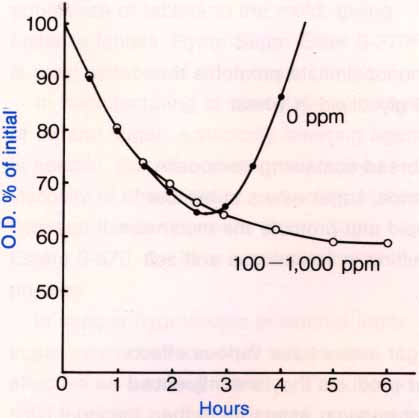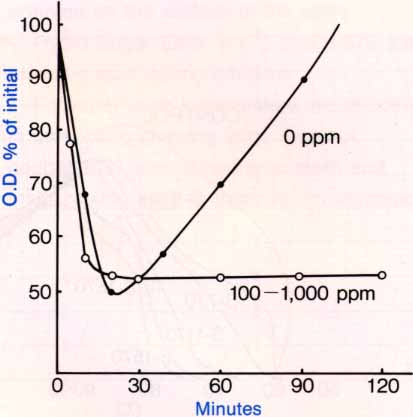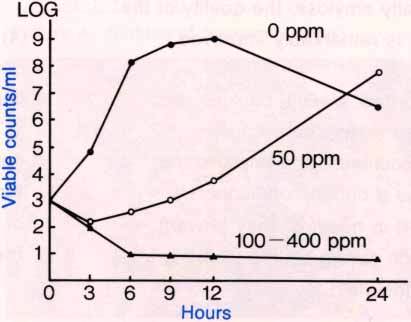|
There was an old report that sucrose monolaurate was effective in inhibiting the growth of Escherichia coli.
Recently in Japan, various canned drinks have been distributed through vending machines at 50-60 Sugar esters are effective for Bacillus stearothermophilus, Bacillus coagulans, Desulfotomaculm nigrificans, or typical anaerobic spore forming bacteria of various members of Clostridium and have the interesting characteristic that the higher the heat resistance of the bacterium is, the smaller the amount of sugar ester required to have an effect.
Show the number of spoiled milk coffee cans manufactured with commercially available sugar containing D. nigrificans which causes the spoilage, and with a given amount of sugar ester (Sugar Ester P-1570) added and left for 3 weeks at 55
Thus about 200 ppm of sucrose palmitate can prevent the spoilage of canned milk coffee sterilized at Fo-16.
Show the relationship between the inhibition of spoilage in the presence of sugar ester (Sugar Ester P-1570) and the sterilization conditions. This coffee contains Clostridium thermoaceticum.
It is clear that the sterilization condition, i.e. Fo value, can be lowered by the addition of 300 ppm of sugar ester. If the Fo value could be lowered, the energy cost would be decreased when manufacturing retort processed foods, or products of higher quality can be manufactured owing to the prevention of quality deterioration caused by high temperature processing. | ||||||||||||||||||||||||||||
|
Sugar Esters,especially palmitate (P-1570, P-1670) or myristate (M-1695) are effective in preventing the growth of C. botuliunm or Clostridium perfringens. Pic1 and Pic2 show the effect of Sugar Ester M-1695 on the germination of spores of C. botulinum in TPYG medium.
It is shown that Sugar Ester M-1695 effectively inhibits the growth after germination of C.botulinum type A and type E.
Pic3 shows the effect of Sugar Ester P-1695 on the growth of spores of C.perfringens in chicken soup containing 50-400 ppm of P-1695 maintained at 37
When 100-400 ppm of Sugar Ester P-1695 was added, no growth of C. perfringens was observed and the number of living bacteria decreased. | ||||||||||||||||||||||||||||



